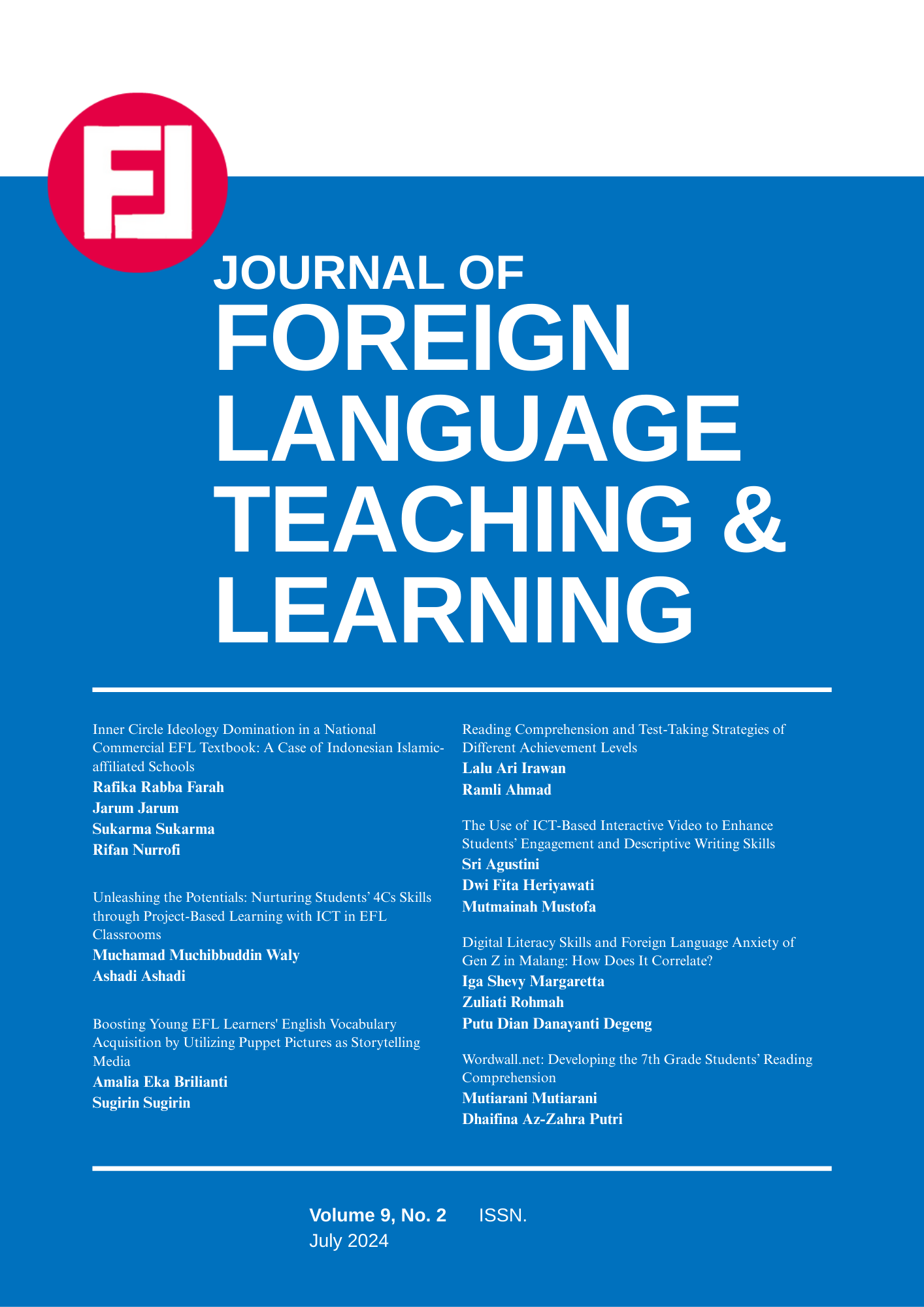Wordwall.net: Developing the 7th Grade Students’ Reading Comprehension
DOI:
https://doi.org/10.18196/ftl.v9i2.22247Keywords:
descriptive text, media, reading comprehension, wordwall.netAbstract
Reading comprehension is a topic vastly studied in the field of language learning. With the rapid development of digital technology, more focus on digital tools regarding reading comprehension is deemed necessary to find the best tool to aid its improvement. This study aimed to discover how the wordwall.net website affected seventh-grade students' reading comprehension in a descriptive text learning topic at SMP Al Amanah South Tangerang. The current quantitative study used a pre-experimental design. Twenty-eight students of class VII C were the sample for this investigation. The pre and post-tests serve as data-collecting tools. Using the t-test formula, the researcher examines how student test scores differ both before and after the treatment is applied. The paired sample t-test table shows the t count is 10.726, and the critical t at the significant level (p) = 0.05 is 1.703. Considering these results, the alternative hypothesis (Ha) is conceded. A significant effect of using the wordwall.net website for reading comprehension in grade 7 at SMP Al-Amanah has been found. The study shows that wordwall.net and other similar sites can be very helpful in making learning more fun and interactive, leading to better grades for students.
References
Alkamel, M. A. A. & Chouthaiwale, S. S. (2018). The use of ICT tools in English language teaching and learning: A literature review. Veda’s Journal of English Language and Literature-JOELL, 5(2), 29-33. https://joell.in/wp-content/uploads/2018/04/29-33-THE-USE-OF-ICT-TOOLS-IN-ENGLISH-LANGUAGE.pdf
Arafat, Y., Rosyid, N., & Kholisah. (2022). Study of literature on improving students' vocabulary through total physical response. English Education Department Journal, 1(1), 1–10. https://jurnal.ubest.ac.id/index.php/eed/article/view/321
Brown, H. D. (2007). Principles of language learning and teaching (Fifth Edition). Pearson.
Bueno, M., Perez, F., Valerio, R., Mareth, E., & Areola, Q. (2022). A usability study on Google site and wordwall.net: Online instructional tools for learning basic integration amid pandemic. Journal of Global Business and Social Entrepreneurship (GBSE), 7(23), 61-71. www.gbse.com.my. http://www.gbse.my/V8%20NO.23%20(JANUARY%202022)/Paper-288-.pdf
Çil, E. (2021). The effect of using wordwall.net in increasing vocabulary knowledge of 5th grade EFL students. Language Education & Technology (LET Journal), 1(1), 21–28. https://www.langedutech.com/letjournal/index.php/let/article/view/16
Creswell, J. W., & Creswell, J. D. (2018). Research design: Qualitative, quantitative, and mixed methods approaches (5th ed.). SAGE Publications Ltd.
Elleman, A. M., & Oslund, E. L. (2019). Reading comprehension research: Implications for practice and policy. Policy Insights from the Behavioral and Brain Sciences, 6(1), 3–11. https://doi.org/10.1177/2372732218816339
Elston, A., Tiba, C., & Condy, J. (2022). The role of explicit teaching of reading comprehension strategies to an English as a second language learner. South African Journal of Childhood Education, 12(1), 1–10. https://doi.org/10.4102/sajce.v12i1.1097
Fauqannuri, I. R. (2021). Penerapan Media Berbasis Wordwall dalam Meningkatkan Motivasi dan Hasil Belajar Siswa Kelas VII B Mata Pelajaran Pendidikan Agama Islam di SMPN 2 Panji Situbondo Tahun Pelajaran 2021/2022 [Undergraduate thesis, UIN Kiai Haji Achmad Siddiq Jember]. http://digilib.uinkhas.ac.id/9879/
Gilakjani, A. P., & Sabouri, N. (2017). How can students improve their reading comprehension skills? Journal of Studies in Education, 6(2), 229-240. https://doi.org/10.5296/jse.v6i2.9201
Hasan, S. W. (2015). The effect of teaching reading comprehension strategies on Iraqi EFL college students’ performance in reading comprehension. University of Babylon Journal, 23(2), 544–561. https://www.iasj.net/iasj/article/103192
Hauer, T. (2017). Education, technological determinism and new media. INTED2017 Proceedings, 10026–10030. https://doi.org/10.21125/inted.2017.2401
Julita, R. (2024). The impact of gamification on EFl students’ reading comprehension. Journal of English as a Foreign Language Education (JEFLE), 4(2), 136–149. https://doi.org/10.26418/jefle.v4i2.74901
Kazhan, Y. M., & Karpiuk, V. A. (2023). Enhancing German language learning through interactive tools. CTE Workshop Proceedings, 11, 15-28. https://doi.org/10.55056/cte.596
Medina, E. G. L., & Hurtado, C. P. R. (2017). Kahoot! A digital tool for learning vocabulary in a language classroom. Revista, 4(12), 441–449. https://revistapublicando.org/revista/index.php/crv/article/view/673#google_vignette
Mohammed, S., & Hasan, F. (2023). Investigating Kurdish EFL students' speed reading and reading comprehension levels at the University of Duhok. Humanities Journal of University of Zakho, 11(3), 643–652. https://doi.org/10.26436/hjuoz.2023.11.3.1091
Mullis, I. V. S., Martin, M. O., Foy, P., & Drucker, K. T. (2012). PIRLS 2011 international results in reading. IEA. https://timssandpirls.bc.edu/pirls2011/international-results-pirls.html
Najeeb, S. S. R. (2013). The business of teaching English as a second language: A Libyan case study. Procedia - Social and Behavioral Sciences, 70, 1243–1253. https://doi.org/10.1016/j.sbspro.2013.01.184
Nation, K. (2019). Children’s reading difficulties, language, and reflections on the simple view of reading. Australian Journal of Learning Difficulties, 24(1), 47–73. https://doi.org/10.1080/19404158.2019.1609272
Nenohai, J. A., Rokhim, D. A., Agustina, N. I., & Munzil, M. (2022). Development of gamification-based Wordwall game platform on reaction rate materials. Orbital, 14(2), 116–122. https://doi.org/10.17807/orbital.v14i2.16206
Oakhill, J., Cain, K., & Elbro, C. (2019). Reading comprehension and reading comprehension difficulties. In Reading Development and Difficulties: Bridging the Gap Between Research and Practice (pp. 83–115). Springer International Publishing. https://doi.org/10.1007/978-3-030-26550-2_5
Poletiek, F. H., Conway, C. M., Ellefson, M. R., Lai, J., Bocanegra, B. R., & Christiansen, M. H. (2018). Under what conditions can recursion be learned? Effects of starting small in artificial grammar learning of center-embedded structure. Cognitive Science, 42(8), 2855–2889. https://doi.org/10.1111/cogs.12685
Rahmawati, A. P., & Wijayanti, P. R. (2022). Implementing joyful learning strategy using Wordwall in order to improve reading comprehension skills. Proceedings Series on Physical & Formal Sciences, 3, 32–35. https://doi.org/10.30595/pspfs.v3i.261
Shehzad, M. W. (2019). The roles of self-efficacy and metacognition in reading comprehension among Saudi EFL learners [Doctoral thesis, Universiti Utara Malaysia] https://etd.uum.edu.my/9045/
Sipayung, K. T., Tampubolon, S., Napitupulu, F. D., & Tobing, F. L. (2021). Generic structure of descriptive text written English language learner and teachers. Linguistics and Culture Review, 5(S3), 1636–1650. https://doi.org/10.21744/lingcure.v5ns3.1950
Swari, N. K. T. A. (2023). Wordwall as a learning media to increase students’ reading interest. Jurnal Pendidikan Bahasa Inggris Indonesia, 11(1), 21–29. https://doi.org/10.23887/jpbi.v11i1.1572
Vaughn, S., Fall, A. M., Roberts, G., Wanzek, J., Swanson, E., & Martinez, L. R. (2019). Class percentage of students with reading difficulties on content knowledge and comprehension. Journal of Learning Disabilities, 52(2), 120–134. https://doi.org/10.1177/0022219418775117
Yang, Y., Tsai, Y.-R., & Hikaru, Y. (2015). Top-down and bottom-up strategy use among good and poor readers in EFL reading comprehension. European Journal of English Language Teaching, 4(3), 101–114. https://doi.org/10.5281/zenodo.2235593
Downloads
Published
How to Cite
Issue
Section
License
Copyright
Authors retain copyright and grant the journal right of first publication with the work simultaneously licensed under a Creative Commons Attribution-ShareAlike 4.0 International License that allows others to share the work with an acknowledgment of initial publication in this journal.
Authors are permitted and encouraged to post their work online (e.g., in institutional repositories, social media account, or on their website) after the article getting published in the journal, as it can lead to productive exchanges and earlier and greater citation of published work (See The Effect of Open Access).License
You are free to:
- Share — copy and redistribute the material in any medium or format
- Adapt — remix, transform, and build upon the material for any purpose, even commercially.
Attribution — You must give appropriate credit, provide a link to the license, and indicate if changes were made. You may do so in any reasonable manner, but not in any way that suggests the licensor endorses you or your use.
ShareAlike — If you remix, transform, or build upon the material, you must distribute your contributions under the same license as the original.
- No additional restrictions — You may not apply legal terms or technological measures that legally restrict others from doing anything the license permits.



.png)





